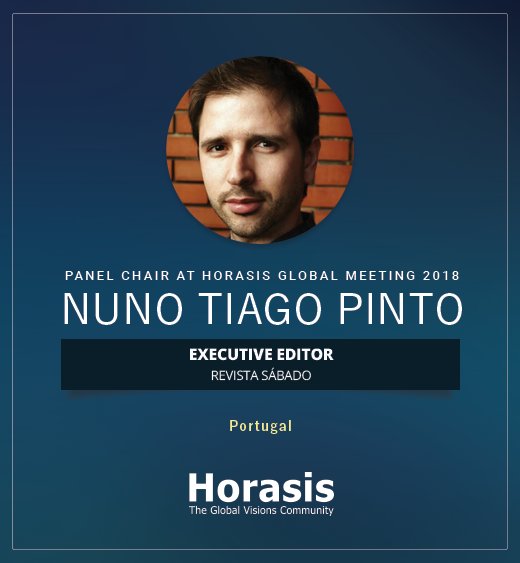This year’s Horasis Global Meeting, which recently took place in Cascais, Portugal, saw a group of panelists attempt to shed some light on the recent phenomenon involving the radicalisation of young people through youth unemployment.
Although the problem of adolescents turning to Islamic extremism is not something Portugal has experienced to date, the editor of Portugal’s Revista Sábado, Nuno Tiago Pinto, who chaired and moderated this discussion at Horasis, shared his thoughts on the subject.
Read More: 50 Portuguese entrepreneurs and politicians to present in Cascais at Horasis Global Meeting
Amongst the speakers at this particular workshop were:
- Baillie Aaron, Founder and CEO at Spark Inside UK, an organisation focusing on rehabilitation programmes for young offenders.
- Sham Bathija, Senior Economic Adviser to the President of Afghanistan
- Julia Hausermann, Founder and President of human rights movement Rights and Humanity in Switzerland.
- Negin Shiraghaei, BBC World Service Persia Presenter and Reporter.
- Sundeep Waslekar, President of India’s Strategic Foresight Group.
Hausermann, from Rights and Humanity Switzerland, pointed out that in some cases, there is a correlation between youth unemployment and radicalisation, but that it is not always correct. For example, European countries such as Spain and Greece who have experienced particularly high levels of unemployment, have not seen particular problems in terms of radicalisation.
“Youth unemployment is a problem, but not a cause for radicalisation” – Nuno Tiago Pinto
She spoke of areas of societal disengagement, such as the Belgian neighbourhood of Molenbeek, home to the largest European population of jihadi fighters going to fight in Syria and Iraq, a community allegedly linked to the 2016 Belgian suicide bombings.
“Hausermann claimed that the fight against radicalisation is made mainly through education and long-term agenda in terms of human rights and development,” reported Pinto, who commented on her view that radicalisation spreads mostly in “failed states.”
In the case of Portugal, although the country has experienced a severe youth unemployment crisis in recent years, particularly affecting those with superior education, Nuno maintains that this has no link to extremism. “Youth unemployment is a problem, but not a cause for radicalisation,” said the Revista Sábado editor, highlighting other side effects, such as emigration.
However, Pinto pointed out that thanks to an integration programme from the International Monetary Fund and the European Central Bank, unemployment rates in Portugal are gradually decreasing. Nuno agreed that this could also be put down to Portugal’s thriving startup scene, which is creating all-important qualified jobs for younger members of the population.
Nuno spoke of his personal experiences dealing with radicalisation and extremism as editor of Revista Sábado. Historic episodes such as ‘Charlie Hebdo’ and its extreme repercussions suggest that the press plays an integral role in society’s approach to radicalism.
“Sometimes as journalists, we have to try to understand the root causes of radicalism so that we can help society to understand it. Our job is not only to report on what they do and what actions they take, but also to try to understand what happened so that a person born in a country like the UK, Spain or Portugal decides to leave their entire life for a reality that’s not theirs and decides to follow a path of violence.”
According to Spark Inside CEO Aaron, society must understand the root causes of crime and the motivations of people who become radicalised. In turn, their reintegration will become easier and the “us vs. them” mentality will cease to exist.
She believes government measures such as the UK’s Prevent Program, put in place to safeguard those at risk of radicalisation, are not effective ways of countering radicalisation. The Prevent Program, put in place by the UK in 2003 but not made public until recently, is centered around four pillars: prepare for attacks, protect the public, pursue the attackers and prevent their radicalisation.
BBC World Service reporter Shiraghaei denied that the root causes of radicalisation stemmed from youth unemployment, instead maintaining that it is predominantly a human rights issue. She stressed the links of radicalisation to violence against women, pointing out that if someone is willing to exert violence at home, they might also be violent outside the home. Shiraghaei also spoke about social media as an influential factor.
Bathija, Senior Economic Adviser to the Afghan President, spoke about radicalisation as a political issue, influenced by the differences in education between Europe and Asia. He stressed the need to address this problem in a global way. This sparked a reaction from Waslekar, President of India’s Strategic Foresight Group, who accused Bathija of being diplomatic, and has invented his own equation to explain the necessary factors for extremism to develop.
In his opinion, D from development deficit + D from democratic deficit + D from dignity deficit = extremism. However, he stressed that this only leads to violent actions in the case that the group are mobilised in order to commit acts of terrorism. He stated that in delicate countries where there is extremism, such as Afghanistan and Iraq, there is war.
Nuno emphasised our responsibility as a society not to fail, but to try and understand the phenomenon in order to prevent it from reoccurring.
As an editor, he said,“my biggest challenge was exactly that, trying to understand those kinds of people.”

